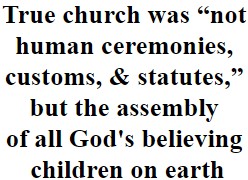Luther's Works.
In the funeral oration he delivered at Luther's coffin, Melanchthon enumerates the main doctrines of Scripture that Luther had brought back to light. Luther put down the virtue and pride of the natural man and showed that the free will of man is nothing, that in spiritual, divine things it can do nothing. He brought to light the great difference between the Law and the Gospel. He showed that man is never justified by the work of the Law, nor is he improved by the Law, that the Law only brings knowledge of sin and terror to the conscience, whereby man continues to grumble against God and hate God. He taught that hearts terrified by the wrath of God are then raised up again by the Gospel of Christ, born again and [p. 199] converted to God. Luther has preached of faith and of righteousness that is before God as no other teacher of Christendom before him. He has directed the eye of the poor sinner solely to that which is apart from him, to the perfect righteousness which is present in Christ and is offered in the Word. Luther, as Melanchthon adds, “has shown the true works pleasing to God, and has thus brought to honor and defended the worldly estates, as no other has done in his writings.”
He taught what the true church was, that it now instructs a child of seven years of age, “not human ceremonies, customs, and statutes,” but the assembly of all God's believing children on earth. He knew how to speak so comfortingly of God's eternal providence, pointing desponding consciences to the wounds of Christ, in which everyone should seek his election. Luther, as Melanchthon put it, “fought in front against the enemies of pure doctrine” and did not leave them a hair's breadth. And this great, godly teacher of Christianity now stands before our eyes as our leader and speaks to us in his writings. And therefore, dear Lutheran Christians, listen to the voice of this prophet of yours! Search first of all the Holy Scriptures, but then also let Luther explain the Scriptures to you! Luther's writings, such as the House Postils, the interpretation of the first book of Moses [Genesis], the interpretation of the consolations of the Lord, John 14-17, have already become a true bread of life for many Lutheran Christians, refreshment and support for their souls. All Lutheran preachers, however, should always be mindful of the fact that, apart from the Holy Scriptures, no other book is so suitable to introduce them to correct theology, to make them clear, firm and certain in the teaching of the divine Word, to give them courage, strength and joy for their ministry and for the struggle that is assigned to them, as Luther's writings. It will be good for our synod if Luther remains in honor among them and is studied and read a lot.


No comments:
Post a Comment
Comments only accepted when directly related to the post.